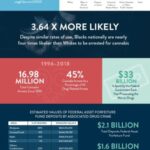As Social Disruptions Roil an Election Year, Policymakers Consider Cannabis and Racial Inequality

Europe’s CBD Market
August 10, 2020
Weeding Out Injustice
August 16, 2020John Kagia, Chief Knowledge Officer, New Frontier Data
The 2020 election cycle portends one of the most consequential moments for the U.S. legal cannabis industry since California adopted the country’s first legalized medical state market in 1996. Not only are nearly half a dozen states advancing ballot initiatives to legalize either medical or adult-use states spanning from New Jersey and Arizona and north to Montana and South Dakota, but the outcomes of the presidential and congressional elections potentially represent a foundation toward substantial reform for federal cannabis policy.
Despite popular transformation of public attitudes toward cannabis over the past 20 years (with two-thirds of the country now supporting full national legalization, and 7 in 10 Americans viewing marijuana use as morally acceptable), advocates assert that the transition from prohibition to legalization present more key issues to overcome – an end to acute, chronic racial inequity regarding cannabis prohibition, and opportunities for minorities to achieve an equitable state in the emerging legal market.
As previously examined through a series of New Frontier Data’s CannaBits, racial inequity in cannabis policies has long been entrenched in policies of enforcement. Despite similar rates of use across races, Black Americans remain nearly four times more likely than are Whites to be arrested for a marijuana offense – a disparity showing only slight deviation throughout two decades, despite a relative sea change in public attitudes and legalization.
Notably, even in legal markets where cannabis-related arrests have declined dramatically, disparities have remained, underscoring how legalization, in itself, does not adequately address ingrained patterns of punitive targeting of poor and minority populations through policing practices.
Furthermore, manners in which cannabis is regulated have made it particularly challenging for those communities most impacted by the war on cannabis to get a seat at the newly legal industry’s table. Most notably, lack of access to national financial markets (due to cannabis’ Schedule 1 classification) has left aspiring entrepreneurs unable to readily access funding capital from banks or other financial institutions. By limiting the industry’s funding to private capital, the national legalization approach has dramatically raised the bar for Black participation in the industry.
According to the Brookings Institute, the average White household’s net worth was nearly 10x that of respective Black households in 2016 ($171,000 vs. $17,150), with disparities widening as income scales increased, the net effect leaving Black entrepreneurs not only less likely to accrue the required capital to start a cannabis business, but also less likely to have access to the capital required within their own communities.
Some states have attempted to remedy the industry’s minority participation gap with social equity programs intended to ensure and encourage minority participation through education and mentorship programs, licensing set-asides, and regulatory concessions intended to lower start-up costs for minority-owned businesses. Yet, few such programs have fulfilled their intent, due a coverage of issues including poor communication with the target communities, court challenges from other operators in the industry, and operational hurdles which have slowed the program’s growth during critical stages of activation for legal markets.
As the U.S. likely advances toward even further expansion of legalization in November 2020, there remain several critical ways in which inequities may be addressed:
- Rescheduling cannabis: The classification of cannabis as a Schedule 1 drug remains the most consequential impediment to ending the highly inequitable enforcement of U.S. prohibition laws. With the Democratic Party declining to include rescheduling in the party’s 2020 platform, it appears that neither Democrats nor Republicans are prepared to broach that foundational reform. However, with several lawmakers proposing varying laws that would reschedule, decriminalize, or otherwise eliminate federal penalties for cannabis, the likelihood of achieving milestone reform during the next presidential cycle is high.
- Decriminalization in states where cannabis is not legal: In the states where cannabis remains illegal, decriminalization is a key step toward ending punitive enforcement for minor possession and use. Virginia became the latest state to decriminalize cannabis, this year enacting a law to penalize possession of up to one ounce by a $25 fine. Those cited would neither face arrest nor a police record, ensuring that minor possession offenses no longer carry the lifelong shackles of a criminal record.
- Bias training for law enforcement: The shocking video of the killing of George Floyd at the hands of Minneapolis police officers sparked a global movement calling for major policing and social reforms. With Black men in particular, far more likely to be targeted by police officers, and far more likely to suffer fatal encounters during such interactions, a major retraining effort will be required both to address implicit biases in policing and to prioritize de-escalation toward minimizing the risks of violent encounters between law enforcement officers and the minority public whom they serve.
- Restructuring of civil asset forfeiture regulations: Civil asset forfeiture has been a tool widely used by federal and state law enforcement to seize assets from those alleged to be engaged in criminal acts. However, use of the forfeiture model to target low-level offenders (with an onerous process by which assets can be reclaimed, and use of such assets to fund law enforcement activities creating perverse incentives for police departments to aggressively pursue and prosecute cannabis due to its widespread use in society) has demonstrably exacerbated exploitative practices.
- Prioritize diversity and mentorship within the industry: With the cannabis industry growing at breakneck speed, increasing minority participation at all levels of the organization (not just the ownership level), should be an industry-wide priority. Not only does research well demonstrate how diversity improves the bottom line for companies, but proactive efforts to recruit, train, mentor, and promote minorities from within the industry help ensure that future industry leaders will reflect the diversity of the communities which they serve.




